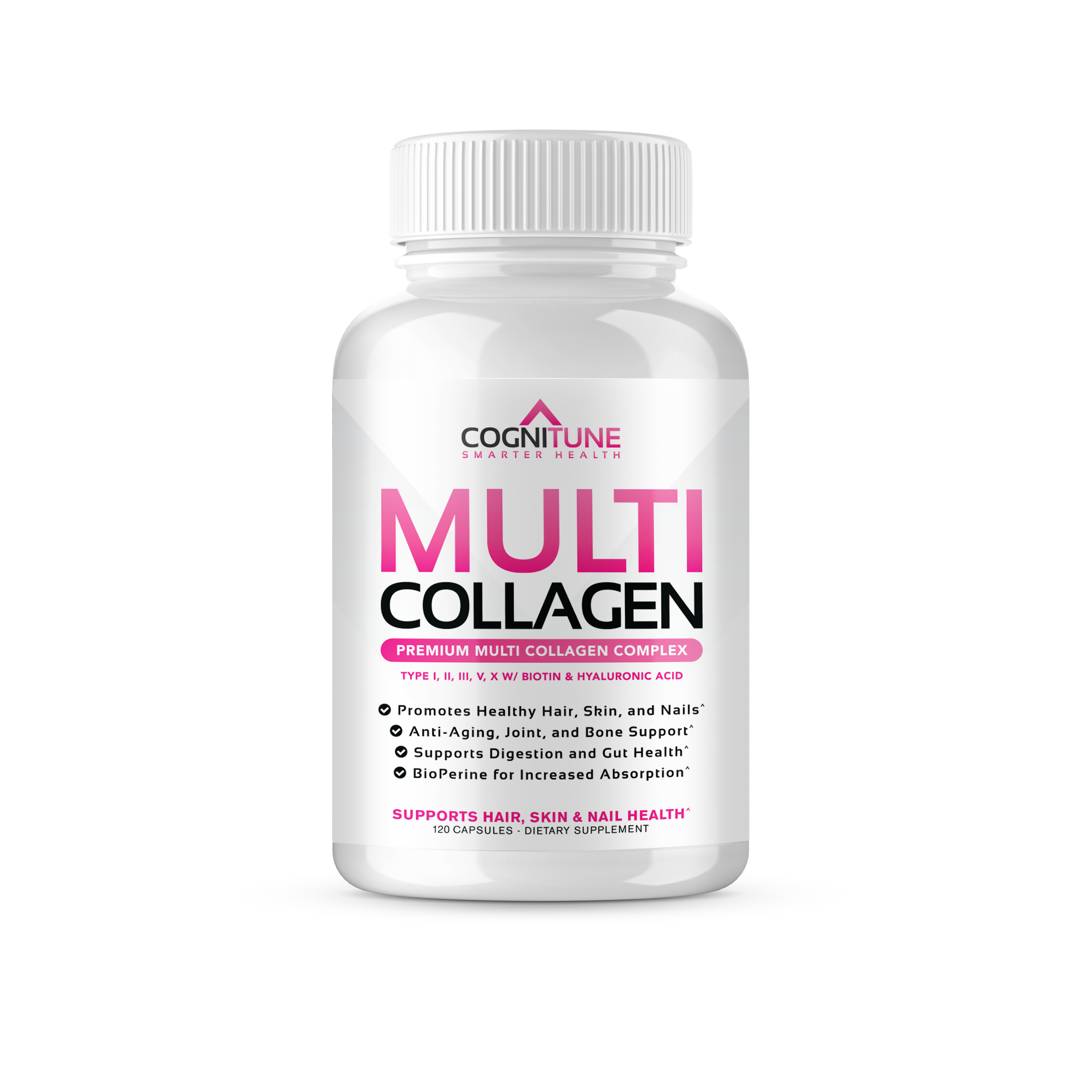Collagen Types and their Health Benefits

Types of Collagen and the Health Benefits of each
In this article, we are going to outline the main types of collagen so you can understand the differences and know more about the supplements you are taking. Then, we will examine some of the main benefits of collagen and the science behind it all.
Collagen has become a very popular protein supplement in recent years. Perhaps the reason it has become so popular is that it exists so plentifully and naturally in the human body. Collagen is a big part of connective tissue. Therefore, supplementing with collagen products makes a lot of sense, and the science is there to support it.
Types of Collagen
Collagen occurs naturally in your body in different forms, each of which has a unique purpose. These differences are relevant in the supplement world because of their usefulness in different kinds of supplemental products. Not all supplements have all types of collagen, so it is crucial to know the benefits of each type and how they complement each other.
There are many types of collagen. In the human body, the most common types are 1, 2, and 3 (referred to as I, II, and III), but a few other types are also common in skin products and different kinds of supplements.
Type I Collagen
Type 1 collagen (COL1A1) makes up the majority of collagen in the human body – up to 90% of the body’s collagen. Because so much of your body’s composition is collagen, a collagen supplement can prove beneficial to the health of specific body regions, both internal and external. It is made of dense elastic fibers and gives structure to the skin, bones, tendons, gastrointestinal tract, and more.
Most often, type 1 collagen is in supplements that improve hair, nail, skin, and bone health. These supplements usually use fish collagen, which also has several amino acids, like proline, glycine, and hydroxyproline.
The reason fish collagen is the go-to source for collagen is because of how the human body absorbs marine collagen the most effective compared to other sources of collagen. Egg collagen is another source, which does contain high levels of type 1 collagen, but you will see this more with type 4 and type 3.
Top Benefits:
- Skin elasticity
- Healing of the skin
Type II Collagen
Type 2 collagen (COL2A1) relates to joint health. This collagen type aids in the formation of the cartilage that acts as a cushion for your joints. Therefore, if people lack type 2 collagen in their body, they may experience painful or cracking joints. It can be a revelation for those who suffer greatly from chronic joint pain.
Type 2 collagen is the most beneficial for those with joint pain. It functions differently than type 1 collagen and should not act as a supplement taken for the same reasons.
The natural occurrence of this type of collagen is in cartilage. When type 2 collagen forms cartilage in the body, it protects the joints between ligaments and improves the symptoms of arthritis.
Most of the type 2 collagen in supplements comes from chickens. Chicken bone broth and protein powder are a common sourced ingredient for this type, and chicken collagen is beneficial in itself because it contains chondroitin sulfate and glucosamine sulfate. Chondroitin sulfate helps reduce pain and inflammation, thus improving joint function; glucosamine sulfate has the same effect because it slows the deterioration of cartilage.
When it comes to the annoying pain of arthritis and other forms of joint pain, one of the best ingredients to look for in a supplement is type 2 collagen (type II).
Top Benefits:
- Osteoarthritis relief
- Improved joint mobility
- Overall improved joint health
Type III Collagen
Type 3 collagen (COL3) is known as being quite beneficial to hair, nails, muscle, and blood vessels, alongside type 1 collagen. Usually, scientists combine type 1 and type 3 in collagen protein supplements due to their similar beneficial effects.
Natural type 3 collagen is the main element in our skin and organs. Overall, the benefits of type 3 are similar to that of type 1, but it has the unique advantage of maintaining the functional integrity of the heart. Where type 1 collagen focuses primarily on skin health, type 3 collagen focuses on the body’s internal organs.
Cows supply the type 3 collagen used for supplements. You will usually see the reference to type 3 collagen as bovine collagen. It comes from the muscles, bones, and skin of a cow, which also provide type 1 collagen.
Top Benefits:
- Increased skin elasticity
- Improved organ function
- Maintain functional integrity of the heart
Type V Collagen
Type 5 (COL V) is a unique type of collagen because it naturally occurs in cancer, granulation tissue, inflammation, atherosclerosis, and the liver. This collagen helps with cell function when it is in your body. When it is outside the body, in the form of a noninvasive serum, for example, it can become a biomarker for assessing fibrotic progression and resolution in experimental hepatic fibrosis.
As heterotrimeric collagen, type V collagen is the product of three genes: COL5A1(V), COL5A2(V), and COL5A3(V). Many genetic diseases are the direct cause of mutations in the type V collagen genes, specifically COL5A1 and COL5A2. However, the collagen itself is very beneficial to hair or placenta.
When collagen 5 (also called collagen V) is in product formulas, it usually comes from the membranes of eggshells. Type 5, and even type 10 collagen, are lesser-used types of collagen in supplements compared to types 1, 2, & 3.
Benefits:
- Builds placenta in the womb
- Forms cell surfaces
- Improved cell function
- Promotion of hair health
Type X Collagen
Type 10 collagen (COL10A1) is another type of collagen that promotes the efficiency of cartilage. It helps form the networks in cartilage and bones. Because of this cartilage formation, joint pain improves, and the effects of bone diseases can sometimes reduce.
Type 10 collagen is in hypertrophic chondrocytes in cartilage, with expression limited to the calcified zone of articular cartilage of long bones. Type 10 collagen facilitates calcification.
This type of collagen is from chicken and bovine sources. You will often this type referred to as “type X collagen,” which is the same as type 10, but it all comes from the same places.
Top Benefits:
- Builds cartilage
- Improves joint health
Click here to check price and purchase our recommended Multi Collagen supplement on Amazon.
Other Collagen Types
Many different types of collagen occur in nature. You can refer to them as Type 1, Type 2, Type 3, etc. Most collagen types use roman numerals for their name.
It is important to note that there are several other types of collagen found in the human body, but we have limited our list to these types because they are the most common types in collagen supplements.
Research on the other types of collagen is also limited. For your diet and supplementary needs, gain sufficient knowledge of these and add them to your collagen routine diet. The best types of collagen to look for are 1, 2, 3, 5, and 10.
Collagen Benefits
Now that we have covered the different types of collagen, it is worthwhile to look at some of the general benefits of collagen supplements to your skin and joint health and more. With a functional understanding of collagen, we can start to see why these research-backed benefits really work.
Arthritis
Collagen shows beneficial effects for arthritis and joint problems, in general. In one random, double-blind, placebo-controlled study, participants with osteoarthritis received BioCell collagen. The collagen group eventually reported a significant reduction in pain as well as a substantial improvement in physical activities. The conclusion of the study was that collagen is effective in managing osteoarthritis symptoms, as well as increasing physical activity capabilities.
Skin Elasticity
Collagen also has a beneficial effect in terms of skin elasticity and anti-aging properties. In a separate double-blind, placebo-controlled study, 69 women received collagen hydrolysate or a placebo daily for eight weeks. At the study conclusion, skin elasticity showed a significant statistical improvement. Additionally, skin moisture and skin evaporation had a positive change.
From the results of these studies, scientists now think of collagen as particularly helpful for older people as they do not naturally produce as much collagen in their bodies; this is part of the reason it is such a popular ingredient in anti-aging creams.
Muscle Mass
Because collagen is a naturally occurring protein, it makes sense that it can have a beneficial effect on muscle development.
A conducted study tested the effects of collagen peptides on post resistance training vs. placebo. Participants underwent a 12-week training routine and were then measured on various factors. The study concluded that the collagen peptide group showed more improvement in terms of fat-free mass, muscle strength, and loss in fat mass.
Collagen could be a very effective post-workout supplement to help with recovery as well as building muscles. Many athletes use it as an alternative to traditional protein powder.
Joint Pain
As we have examined above, collagen plays a major role in contributing to your cartilage, which is vital to joint health. Healthy cartilage reduces strain within joints and helps to keep them lubricated to avoid friction.
Click here to check price and purchase our recommended Multi Collagen supplement on Amazon.
A 24-week study tested the effects of collagen hydrolysate on athletes that were constantly physically active. These athletes originally had joint-pain, but no history of joint disease. They were monitored for joint pain, mobility, and inflammation. Athletes who received collagen did have a noticeable difference in joint pain as compared to the placebo group.
The study concluded that more research was needed, but the results expressed joint relief on every level.
Conclusion
Collagen is a useful supplement for many reasons. In this article, we gave you a rundown on the different types of collagen so that you can understand their benefits and choose the right one for you.
We recommend that you do your research on whether collagen supplementation is a good idea for your needs. The bottom line is you want a supplement routine that matches your personal circumstances. It’s always a good idea to consult with a physician who can better guide you on how to introduce this supplement to your diet the right way.
Click here to check price and purchase our recommended Multi Collagen supplement on Amazon.
- https://www.ncbi.nlm.nih.gov/books/NBK21582/
- https://www.ncbi.nlm.nih.gov/pubmed/26910848
- https://www.ncbi.nlm.nih.gov/pubmed/22486722
- https://www.ncbi.nlm.nih.gov/pubmed/23949208
- https://www.ncbi.nlm.nih.gov/pubmed/26353786
- https://www.ncbi.nlm.nih.gov/pubmed/18416885
- https://www.sciencedirect.com/topics/biochemistry-genetics-and-molecular-biology/type-v-collagen
- https://www.sciencedirect.com/science/article/pii/B9780128098479000106

